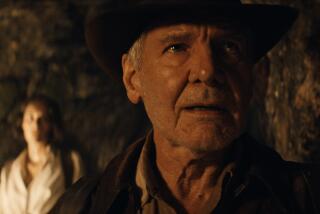GENESIS OF A BLEAK DRAMA OF PIPE DREAMS
Eugene OâNeillâs massive âThe Iceman Comethâ opens Wednesday at the Doolittle Theatre, staged by Jose Quintero and starring Jason Robards. Robards and Quintero first did the play in 1956 at Off-Broadwayâs Circle-in-the-Square Theatre, a revival that established Robards as an importantactor and re-established OâNeill as a living presence in the American theater. OâNeillâs foremost biographer, Louis Sheaffer, discusses âIcemanâsâ genesis and its meaning, while Robards describes his sometimes troubling experiences as an OâNeill actor.
For years, Eugene OâNeill sporadically used to turn over in his mind bits and pieces of a âlower depthsâ play, a drama set in a saloon and peopled with the sort of hard-bitten characters he had known as an occasional seaman and full-time boozer. He often told friends that he must write that play. âOh, God, those old days!,â he would say. âNobodyâd believe it. Nobodyâd understand it. . . .â
As the 1930s drew toward a close, the bits and pieces began to crystallize when he had the idea of making his protagonist a self-appointed messiah, one with âthe salvationist bugâ who aims to save some lost souls in a scruffy waterfront bar from themselves.
The writing went smoothly. It did, that is, until the Germans invaded Poland in September, 1939, and set Europe aflame with World War II. Too demoralized to work, OâNeill spent his days in his mountainside home near Danville, Calif., listening to the war news on the radio.
What he had to say in the play, though, was so important to him that the outbreak of war deterred him only briefly. The writing again went well and âThe Iceman Cometh,â begun in June, was finished in late November. The author considered it among his finest works, a view he likewise had held for a while about several of his weakest efforts, but this time he was right. It was his peak achievement to date, one that would be equalled, if not surpassed, only by his âLong Dayâs Journey Into Night.â
One of his masterworks, âIcemanâ is also, philosophically speaking, his bleakest play. Set entirely in a squalid barroom in lower Manhattan and concerned with a raftload of defeated souls who are saved from the reefs of despair by a tide of whiskey and self-delusion, the play maintains that people cannot accept the truth, especially about themselves, but must take refuge in pipe dreams.
Said Larry Slade, the authorâs chief spokesman: âTo hell with the truth! As the history of the world proves, the truth has no bearing on anything. . . . The lie of the pipe dream is what gives life to the whole misbegotten mad lot of us, drunk or sober.â
While writing the play, which is set in 1912, OâNeill felt that he had âlocked myself in with my memories.â The saloon was modeled on several he used to frequent, including Jimmy the Priestâs near the New York waterfront, and the Golden Swan in Greenwich Village, known to its habitues as âThe Hell Hole.â
Describing the dive in âIceman,â one character says: âItâs the No Chance Saloon . . . the End of the Line Cafe. Donât you notice the beautiful calm in the atmosphere?â No one here has to worry abut where âtheyâre going next, because there is no farther they can go.â
Except for several prostitutes and bartender-pimps, the denizens of Harry Hopeâs joint--one-time journalists, army officers, policemen, law students, circus workers, anarchists--have seen better days.
Without exception each clings to a sustaining pipe dream (the term recurs). Like drunks leaning against one another to remain vertical, each professes belief in the otherâs self-deception. The basic element in their pipe dreams is: Tomorrow. Tomorrow they will quit drinking, get a grip on themselves, and become responsible, respectable members of society.
Nearly all of them live in Harry Hopeâs flophouse above the saloon, and as the story begins they eagerly await âHickeyâ--Theodore Hickman, a traveling salesman who turns up periodically with an epic thirst and treats the whole gang to a stream of drinks while he, too, wallows in booze.
Cherished by the gang not alone for his generosity, he is âa great one to make a joke of everything and cheer you up.â His favorite joke is to display a photo of his ultra-proper wife, then remark that he left her at home in bed with the âiceman.â
Like barnacles attached to an old hull, Harry Hopeâs regulars appear to be in their natural habitat, but Don Parritt, a newcomer, clearly does not belong. Vaguely repugnant, he is the son of Rosa Parritt, an anarchist who, with several male confederates, has been jailed for life for a fatal bombing on the West Coast. (This part of âIcemanâ is based on the notorious MacNamara bombing case in Los Angeles during the 1910s, in which a radicalâs venal son informed on her and the others.)
Parritt has come to the saloon seeking sympathy and counsel from Larry Slade, an ex-anarchist and one-time lover of Rosa Parritt, but the latter keeps trying to avoid the youth.
When Hickey eventually appears, he has changed from the man the gang had known. Though he still wisecracks and sets the drinks to flowing, he is now obsessed with saving them. Convinced that he has found the only road to personal salvation, Hickey insists that pipe dreams are what âreally poison . . . a guyâs life.â He found âreal peace,â he says, when he faced himself without âthe old false whiskers.â
Now he wants the crew at Hopeâs, the best friends he ever had, to follow suit and thereby free themselves from remorse over their failure to reform. Some time passes before the play discloses the nature of Hickeyâs self-inception, but his wife Evelynâs pet dream was that some day he would end his bout of unrestrained drinking, his periodic descents into the gutter.
Under pressure from Hickey, the various drifters try to realize âtomorrowâ goals, but instead of gaining peace in the attempt, as the evangelizing salesmen had promised them, they fall into despair and start hating not only themselves but the others, most of all Hickey. Where the atmosphere in the saloon formerly had been one of warm, boozy camaraderie, the place is now as cheery as a morgue. In desperation, Hickey, who had earlier reported that his wife was dead, discloses that he had shot her as she slept--but, he insists, he did it from love, for her sake, hence his feeling of real peace.
Thus, the title of the play has both ribald and sinister meanings: First, it alludes to the old joke about the man who calls up to his wife, âHas the iceman come yet?â to which she replies, âNo, but heâs breathing fast.â In the second and dark sense, the title means that Death the Iceman has come to Evelyn Hickman.
The various âIcemanâ characters were based, OâNeill has said, on âpeople I once knew or knew of, although none . . . is an exact portrait of anyone.â
At least four of them, however, closely resemble their models--saloon keeper Harry Hope, Larry Slade, James Cameron, the leader of the âTomorrow Movement,â and Hugo Kalmar, an ineffectual radical whose surname is an abbreviation of Karl Marx.
As for Hickey, the playwright used to deny that he was drawn from life: âNo, I never knew him. Heâs the most imaginary character in the play.â
In sad reality, the author knew him all too well, for the Hickey who long harbored a hatred he could not acknowledge, the Hickey tortured by guilt feelings and self-loathing, was OâNeill, just as he was also the Don Parritt who writhed under the knowledge that he had condemned his mother to a living death.
Time and again in his works OâNeill, one of the most autobiographical playwrights ever, had presented images of his mother and dramatized aspects of his feelings toward her. In the interlocked stories of Hickey and Parritt he at last gave full vent to his fury against Ella Quinlan OâNeill, whose damnation as a drug addict had begun unwittingly with his birth. This was the source of her sonâs bad conscience and feelings of self-hatred that would fester in him to the end of his life.
Once OâNeill had relieved, through Hickey, his sense of outrage, he was ready to write his next play, âLong Dayâs Journey Into Night,â a laceratingly honest family portrait, which discloses, among other family skeletons, his motherâs drug addiction.
More to Read
The biggest entertainment stories
Get our big stories about Hollywood, film, television, music, arts, culture and more right in your inbox as soon as they publish.
You may occasionally receive promotional content from the Los Angeles Times.










